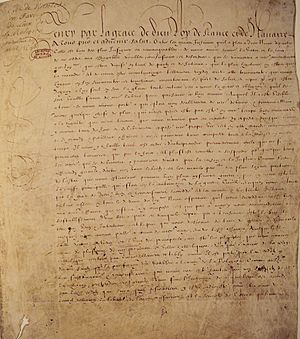Treaty of Nantes facts for kids
The Treaty of Nantes (also called the Edict of Nantes or Edict of Nantz) allowed Protestants a limited freedom of religion in France. It was made official on April 13, 1598. The purpose was to make peace after the French Wars of Religion.
King Louis XIV revoked the Edict of Nantes and made Catholicism the religion of France in 1685. This made many Huguenots (French Protestant)s leave.
Opposition
Louis XIV did not like the Edict of Nantes. Being an absolute ruler, Louis thought that there should be one king, one nation, and one church only - and that church had to be the Roman Catholic Church. The king let Roman Catholics persecute Huguenots even after the Edict. He hoped the Huguenots would become Roman Catholics. Finally, in 1685 King Louis withdrew the Edict of Nantes.
The government declared that no one could believe in any religion except Roman Catholicism. Anyone joining in a Protestant service could die. Because of this, many Huguenots died for their faith. Some, though, gave up and became Roman Catholics. Others, refusing to stop being Protestants, ran away from France.
Louis XIV was horrified when he lost the Huguenots. They were among the most skilled workers in France. Many bankers, weavers, and merchants were Huguenots. Louis XIV ordered that France's borders be closed, and said that nobody could leave the country without his permission. However, Protestants still found ways to escape. Some hid in barrels on ships sailing away from France. Others disguised themselves as peasants and escaped. All together, probably more than two hundred thousand Huguenots ran away.
Protestant countries in Europe were glad to have such hard-working subjects: over a third of the Huguenots went to the Netherlands. From there many of them went to the Dutch colony at the Cape of Good Hope. Many went to England, and from there to America, especially Virginia and the Carolinas.
These immigrants were very valuable to their new home countries. They were hard working, obedient, and talented. They also brought many secrets of French manufacturing with them: for example, they introduced silk production to the rest of Europe.
Images for kids
-
Henry IV of France by Frans Pourbus the younger.
-
Louis XIV, by Hyacinthe Rigaud
See also
 In Spanish: Edicto de Nantes para niños
In Spanish: Edicto de Nantes para niños




